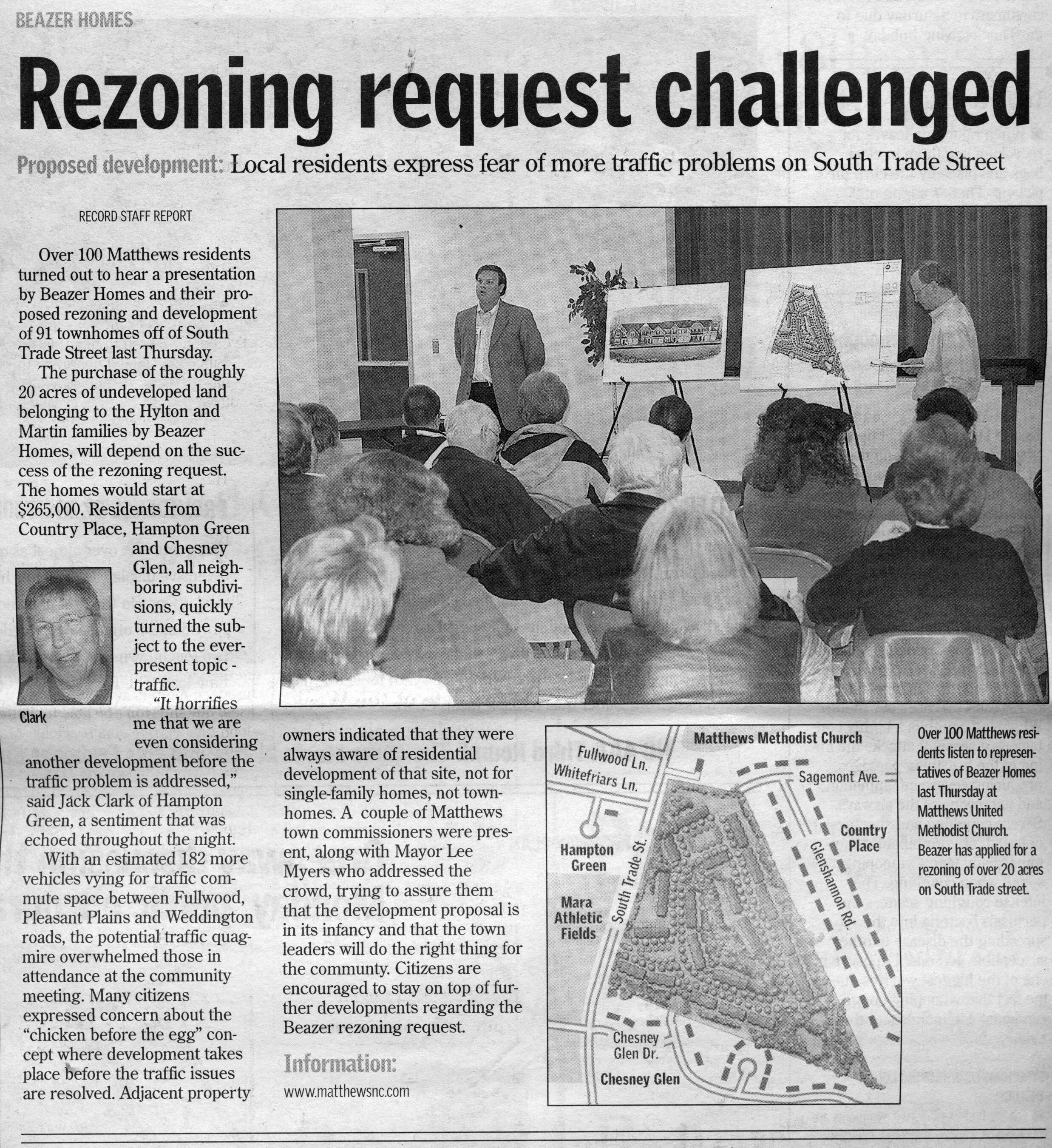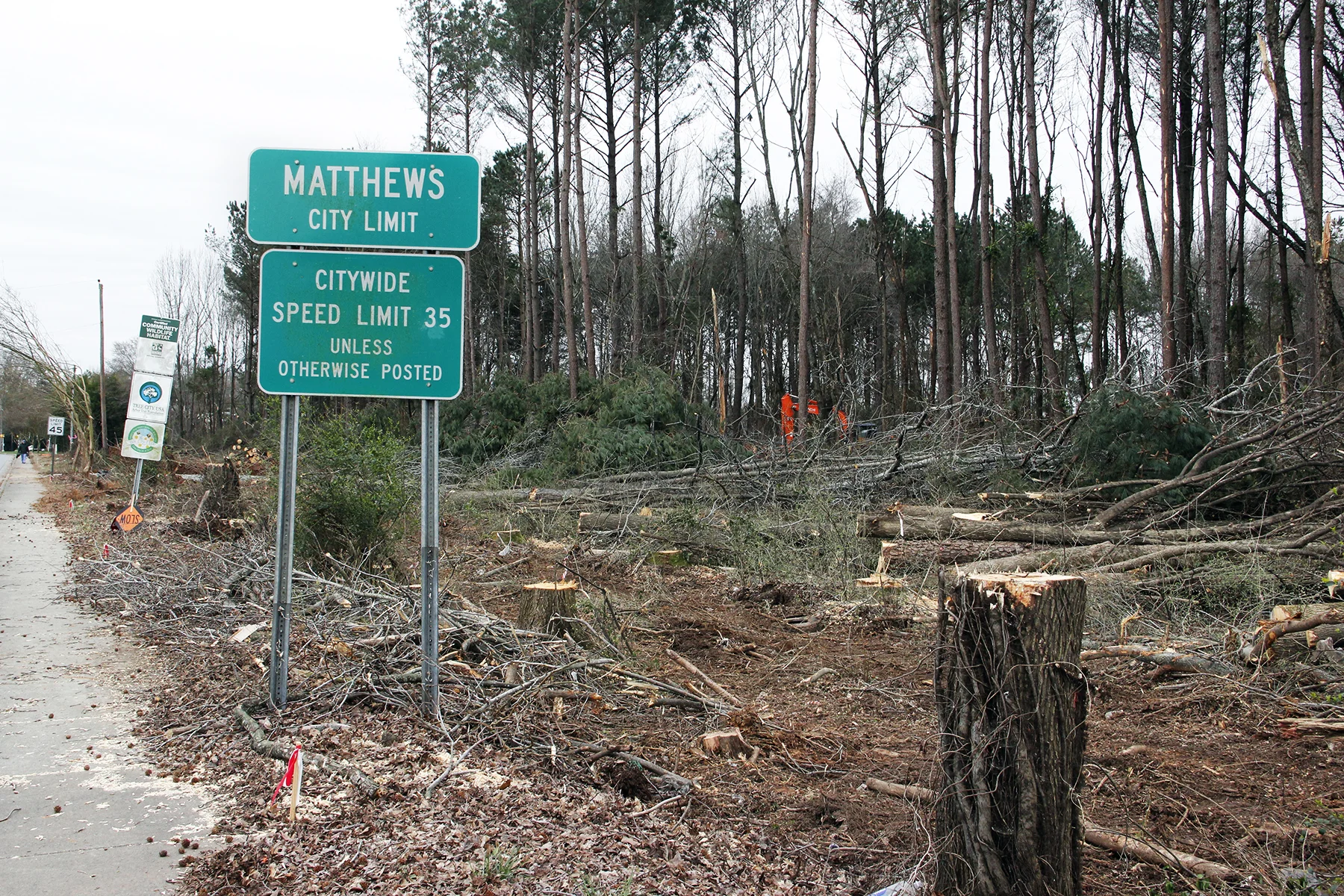Photo by Renee Garner
When Jessica Moreno, 25, of Oak Haven Mobile Home Park (near Matthews-Mint Hill Road and Highway 74) saw a rezoning sign at the park entrance last year, her worst fears (amid swirling rumors) were confirmed. The previous owners were planning to sell the 30.26-acre property; the 25 other resident-families would now need to move.
I know that housing is a major issue. I know it gets harder as Mecklenburg County continues to grow in numbers, daily, and as more beautiful homes and apartment complexes get built.
However, this group of people (who would only qualify for affordable housing) had few options.
For most of the residents who owned their homes but leased the land, there were no available mobile home spaces in Mecklenburg County; many families could not secure a sale or afford to move their homes to other areas. More importantly, Matthews was a town they loved – a place which afforded, as they put it, charm, good schools, safe neighborhoods, and an affordable rent lot.
Jessica, her mother, and sister had seen their share of hard times. Prior to living in the Park, they had endured a rental foreclosed from under them, a few scams (and lost money), and missed opportunities due to external factors beyond their control.
When Jessica’s mother, Maria Dolores Gomez, found the Park, they were elated. A hard-working woman, who had endured years of night shifts in a warehouse job, Maria promptly spent $20,000 - her entire life’s savings - to secure a mobile home and a piece of the Park. They would find stability and a place they could truly call home. Jessica called it their “diamond in the rough.” That was seven years ago.
This was now.
So, Jessica and her mother set out on a journey to find available options. Her mother began knocking on doors. She organized stay-at-home moms from the Park and went on a mission to find help and legal advice. The group ended up at the Latin American Coalition in Charlotte, which was closed that day. Standing outside the building, a man leaving on a bike noticed their distress. He approached them and asked what their situation was. That man then referred them to his roommate, community organizer and Director of Action North Carolina’s Charlotte office, Hector Vaca, who later spoke to the women and agreed to help.
Enter Jessica.
Having graduated from Independence High, with deep connections to Mint Hill, she was working a full-time job in business development at a local water damage company. As she tells it, her life included her 9-5 job, going to church and working with the Mint Hill Lions Club. Now, she was fighting for her life in a way she was unaccustomed to. This was a fight which had, as she put it, “become highly personal.”
Hector came to the neighborhood and helped the group form a campaign (initially known as #SaveOakHaven, later known as “Oak Haven Affordable Housing Initiative”). He helped guide them toward the media, speaking out at zoning meetings and setting the groundwork to gain public attention.
In the end, he helped secure $8000 from Bainbridge Communities Acquisition for each family, for relocation costs – a relocation plan, as it was called – part of the necessary steps for the town to approve the rezoning.
After winning the settlement, Jessica was transformed. “I did not realize how much power people had when they stuck together and organized,” she said. “To be clear, we did not win this fight. When we formed our campaign, our #1 goal was to keep Oak Haven open. We lost our home and community, but this small win ignited a fire in me that would continue to burn with Action NC’s help.”
The experience and knowledge that this could happen to other communities left Ms. Moreno determined to learn about all things concerning mobile home parks and cooperatives. During this time, she spent more and more time at Action NC and started attending meetings for their Immigrant Rights Chapter, Lideres en Accion.
My community has paid a price that is far greater than the value of the buildings that will be built where we once existed.
“I would…participate in workshops and started meeting with Charlotte City Council members,” she said. “I knew it was time for a change in my life. I was encouraged to apply for an open position at Action NC (at the end) of 2017.” She started working there in April of 2018.
“I do believe that everything happens for a reason. I know I have been divinely placed here and have experienced what I have experienced for good reason. I now help residents from other neighborhoods organize themselves and fight for what is right.”
This year, she has been working with other tenants around Charlotte and has formed a tenant Justice Chapter where members will focus on making sure people know their rights and have support to organize. Next year, she will be focusing on immigration reform and combating the attacks on immigrants locally.
“My experiences fuel my being with hope and love for the people around me,” said Jessica. “I know that housing is a major issue. I know it gets harder as Mecklenburg County continues to grow in numbers, daily, and as more beautiful homes and apartment complexes get built.”
“The problem is that, like, in my case, development has come at a great price. My community has paid a price that is far greater than the value of the buildings that will be built where we once existed… The price we paid is in blood. Three hundred fifty apartments will be built on top of 26 hard-working families and seniors. Our blood is its foundation.”
Today, Jessica lives 45-minutes away, in Gastonia. “There was nowhere to move our home,” she said. “I ended up gifting my home in Matthews to a neighbor who has been able to move it and live in it.” Other residents have taken their homes to Gastonia, Monroe, Indian Trail, Wingate, Concord. The remainder – nearly all the rest - are renting in Charlotte.
“I never imagined leaving Mathews under these circumstances,” she said. “I was hurt about it.”
Photo by Cyma Shapiro
“The reality of not having anywhere to go was very real to me. I was not able to find anything affordable in Mecklenburg County and neither were my neighbors, except the ones who left their homes and lost their investment.”
However, she feels lucky to have even found an option. “Where I am, I have three sheep, two dogs, and chickens. I was able to buy land in Gastonia with a mobile home. I know I was blessed. But, the reality of not having anywhere to go was very real to me. I was not able to find anything affordable in Mecklenburg County and neither were my neighbors, except the ones who left their homes and lost their investment.”
In the end, her words are bittersweet: “I am Latinx. I am the daughter of immigrants from Mexico. I am a woman. I am affordable housing. If you don’t support any of these things, then, you don’t support who I am... and I am perfectly okay with or without it.”
And, for Jessica, the fight has just begun: “The fight to hold developers, elected officials, and each other accountable in our communities continues. The fight against the attacks on migrants continues. The fight for women’s rights continues. The fight for LGBTQ rights continues. The fight for senior rights continues. The fight against for tenant’s rights continues. We will continue to fight for environmental justice and keep the police accountable...”












